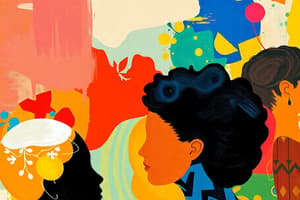Podcast
Questions and Answers
What are the parts of the theoretical framework of multicultural counseling and therapy?
What are the parts of the theoretical framework of multicultural counseling and therapy?
- Assessment issues (correct)
- Racial, ethnic, and cultural attitudes (correct)
- Cultural competence (correct)
- Sociopolitical influences (correct)
What is the primary focus of Chapter 1 in the text?
What is the primary focus of Chapter 1 in the text?
Understanding resistance to multicultural training.
Becoming an effective multicultural counselor or therapist is a lifelong __________.
Becoming an effective multicultural counselor or therapist is a lifelong __________.
journey
Expectations of White and trainee students regarding multicultural counseling are often the same.
Expectations of White and trainee students regarding multicultural counseling are often the same.
What are some emotions that students might experience when discussing multicultural counseling topics?
What are some emotions that students might experience when discussing multicultural counseling topics?
Which of the following feelings did the African American student express about Multicultural Counseling?
Which of the following feelings did the African American student express about Multicultural Counseling?
Both trainees approach the course with some __________.
Both trainees approach the course with some __________.
Many socially marginalized group members react positively to the content of Multicultural Counseling.
Many socially marginalized group members react positively to the content of Multicultural Counseling.
What percentage of clients of color report experiencing at least one racial microaggression in therapy?
What percentage of clients of color report experiencing at least one racial microaggression in therapy?
Flashcards
Multicultural Counseling Dimensions
Multicultural Counseling Dimensions
Integrating diverse populations into therapeutic practice involves theoretical, conceptual, research, and practical considerations.
Resistance to Multicultural Training
Resistance to Multicultural Training
Resistance can impede the development of cultural competence and humility.
Differing Expectations in Training
Differing Expectations in Training
White trainees often seek objective, calm discussion, while trainees of color want honest dialogue about race.
Emotional Variability in Discussions
Emotional Variability in Discussions
Signup and view all the flashcards
Typical Emotional Responses
Typical Emotional Responses
Signup and view all the flashcards
Importance of Differing Worldviews
Importance of Differing Worldviews
Signup and view all the flashcards
Multicultural Counseling Emphasis
Multicultural Counseling Emphasis
Signup and view all the flashcards
Self-Awareness Importance
Self-Awareness Importance
Signup and view all the flashcards
Microaggressions Statistics
Microaggressions Statistics
Signup and view all the flashcards
Study Notes
Multiple Dimensions of Multicultural Counseling and Therapy
- Integration of diverse populations in therapeutic practice involves theoretical, conceptual, research, and practical dimensions.
- Multicultural counseling and therapy is organized into five parts addressing various essential aspects:
- Affective, conceptual, and practice dimensions
- Sociopolitical and social justice dimensions
- Racial, ethnic, cultural attitudes
- Western and non-Western perspectives
- Assessment, diagnosis, and treatment issues
Understanding Resistance to Multicultural Training
- Personal resistance to multicultural training may hinder the development of cultural competence and humility.
- Emotional reactions to discrimination-related topics pose barriers for effective engagement in discussions.
- Differences in worldview between majority and marginalized group members influence their responses to discussions on race.
- Majority group members typically react defensively compared to more open expressions from marginalized individuals.
- Becoming an effective multicultural counselor is recognized as a lifelong journey with ongoing self-discovery outside of intellectual exercises.
Class Expectations and Reactions
- Expectations shape student experiences:
- White trainees often seek objective, calm discussion, desiring to keep political aspects out.
- Trainees of color express frustration towards superficial handling of race-related topics and long for honest dialogue.
- Emotional variability in students can lead to conflicts during discussions, with exchanges sometimes turning into heated debates.
- The course content challenges students, prompting powerful emotional reactions linked to personal and collective identities.
Emotional Responses from Students
- White student reactions often reflect defensiveness and anger towards perceived bias, viewing the content as accusatory and political.
- Students of color tend to resonate positively with the course material, feeling validated and liberated by honest discussions of their experiences.
- Not all students fit uniform patterns of reaction; individual experiences and backgrounds lead to diverse emotional outcomes.
Importance of Understanding Differing Worldviews
- Acknowledging different racial realities arising from unique lived experiences enhances effectiveness in multicultural counseling.
- Multicultural counseling emphasizes the importance of listening to and validating the narratives of racially and culturally diverse clients without imposing one's definitions.
- Self-awareness is crucial for helping professionals to navigate their biases, prejudices, and inherent stereotypes effectively.
Statistics on Microaggressions
- A significant percentage (41–83%) of clients of color have reported experiencing racial microaggressions in therapy.
- Commonly reported microaggressions involve the avoidance or minimization of cultural issues.
- A majority (76%) of microaggressions go unaddressed during therapy sessions, highlighting gaps in cultural competence among helping professionals.
Studying That Suits You
Use AI to generate personalized quizzes and flashcards to suit your learning preferences.



